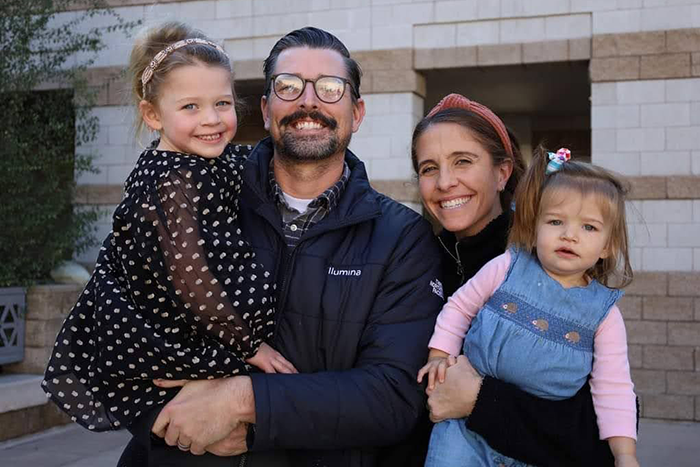
One of my most treasured memories is of my husband buying Purim carnival wristbands for our children. This act might seem small, but it symbolized a significant shift for us. See, my husband isn't Jewish, but we are raising a Jewish family. My husband taking the initiative to buy the Purim tickets reflects the impact of Jewish spaces striving to become communities of belonging where interfaith families feel welcome.
We are a part of Congregation Beth Israel in San Diego. CBI, as we fondly call it, is a model of what it means to be a community of belonging and has enabled and empowered us to raise a Jewish family.
The CBI community extended a warm embrace to every member of our family, including my husband. The congregation's inclusive approach made a profound difference - my husband no longer felt like he was merely tolerated, but rather, he belonged.
Our experience underscores a critical truth: for the Jewish community to thrive and grow, we must fully embrace, not just lukewarmly accept, interfaith families. The Pew Research Center reports that about two-thirds of intermarried couples with one Jewish partner raise their children as Jews. These families are vital to a vibrant Jewish future. If interfaith families feel marginalized, they are less likely to engage, and thus less likely to engage with the community, our entire Movement suffers.
We must create spaces where every member, from any background, has the opportunity to experience a sense of belonging and knows that they are valued, essential, and embraced for who they are.
Simply saying that your community welcomes interfaith families is not enough. Such a statement mustbe accompanied by concrete actions. Creating a sense of belonging for interfaith families doesn't require grand gestures. Often, it's the little things that are the most significant:
- Non-Judgmental Support: When I told our clergy that we hadn't arranged naming ceremonies for our daughters, they responded with excitement and are helping us plan a ceremony for both. Their understanding and support have been invaluable.
- Inclusivity in Leadership: My daughter's religious school teacher isn't Jewish. This might seem like a small detail, but it really isn't. My daughter, who is five, comes home telling the story of Passover and sings "Modeh Ani" on the drive home from religious school. She is asking to light Shabbat candles and make cheesecake with me on Shavuot. This raises an important question: Does it matter if her teacher is Jewish-adjacent rather than Jewish? If her teacher is fully committed to teaching through Reform values, practices, and traditions, then my daughter is receiving a comprehensive Reform Jewish education. In fact, having a non-Jewish teacher who is dedicated to these principles enriches her experience by demonstrating that Jewish values can resonate broadly and inclusively. This openness in leadership roles sends a powerful message of inclusion and reinforces the idea that commitment to Jewish values is what truly matters.
- Bake Belonging Into the Community: Cultivating authentic belonging means extending a warm embrace to everyone, particularly to those who are often not affirmed including BIPOC, people with disabilities, members of the LGBTQ+ community, and singles in addition to interfaith families.
At a recent Young Family Shabbat at Congregation Beth Israel-a 30-minute event with songs and prayers designed for preschool-aged children-my two- and five-year-old daughters were dancing and giggling. Rabbi Jason Nevarez, noticing some parents' discomfort, reassured us by saying, "Parents, please don't quiet your children. This is Shabbat; Shabbat is joy. Let them dance, run, and giggle." His words affirmed that we and our busy kids belonged. This sense of belonging in my community includes everyone, members of interfaith families, a young family with active children, and educators from any faith and cultural background. Whether you are a leader or a community member, everyone plays a part in setting these expectations. An authentic community of belonging is one where everyone is embraced, seen, and welcomed.
By valuing and supporting interfaith families, we not only strengthen our community, but also ensure its growth and vibrancy for generations.
Related Posts

Being the “Jewish Influencer” in My Family

Winterfaith

